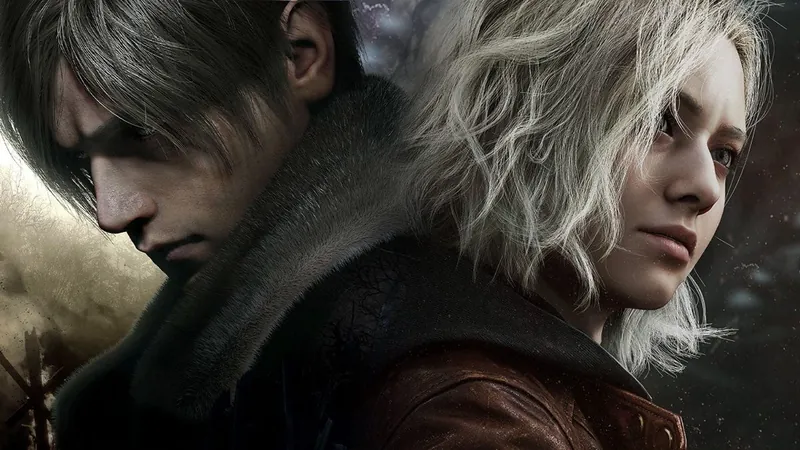
20 Years Later: Resident Evil 4's Undying Influence on Capcom
2025-07-09
Author: John Tan
Is Leon S. Kennedy the face of Resident Evil because he starred in one of the series' greatest games, or is that game celebrated for featuring him? This age-old question lingers as Leon's impact on the Resident Evil universe has only intensified since his first appearance in 1998, threatening to overshadow the franchise's future once again.
When Resident Evil 4 arrived on January 11, 2005, it turned everything fans knew about the series upside down. The classic fixed camera was replaced with a dynamic 3D perspective, and the clunky controls morphed into fluid action and melee combat. Leon transitioned from rookie cop to secret agent, tasked with rescuing the President’s daughter from a sinister cult, evolving from a timid hero to an action star.
RE4 is rightfully considered a Hall of Fame game, yet its massive success sent Capcom into a disorienting phase. The shift towards action-centric gameplay came at the expense of the franchise's iconic horror roots. Resident Evil 5 featured car chases and gunfights in Africa, while Resident Evil 6 escalated the chaos to blockbuster proportions. Despite financial triumph, fans felt the franchise drifted too far from its origins, turning everyday heroes into super-agents.
In 2017, Capcom sought to reconnect with the horror at Resident Evil's core by rebooting the series with Biohazard. For this installment, Leon and the series’ legendary characters took a backseat to newcomer Ethan Winters, an everyman who endured gruesome challenges without the beloved gunplay and acrobatics of his predecessors. Resident Evil 7's first-person perspective revitalized the experience, leading to strong sales and a focus on the Winters family.
The Resident Evil 7 era saw little desire to revisit the action-heavy design of RE4. However, Leon’s presence lingered through remakes of earlier games. The RE2 remake modernized the classic, echoing the over-the-shoulder mechanics of Leon's groundbreaking adventure, while the RE4 remake balanced horror with combat. As time passed, fans grew restless for a new journey with Leon rather than rehashing old classics.
This year, Capcom announced the highly anticipated Resident Evil: Requiem, introducing another new lead: FBI analyst Grace Ashcroft. Despite the focus on Grace, Leon’s name has been invoked repeatedly online, suggesting fans expect him to play a significant role, whether as a co-lead, a cameo, or even the hidden star.
Capcom insists Grace is the true face of Requiem, and her background connects her to the series’ history, being the daughter of a former character. In addressing the rumors surrounding Leon, director Koshi Nakanishi noted, "We considered making Leon the protagonist, but creating a horror game around him poses challenges... We don’t want to see him terrified at every turn."
Having experienced a slice of Requiem, it’s clear Capcom is prioritizing horror, highlighted by Grace’s reactions to jump scares, which enhance the tension. Leon, now a battle-hardened veteran, wouldn’t fit the mold of a frightened protagonist in this new narrative.
This real-time aging of the franchise—placing Leon at approximately 50 years old in Requiem—leads to a narrative where he becomes part of the old guard. Should he appear, it would likely be to support Grace, similar to Chris in Resident Evil Village. However, the focus on Leon has overshadowed Grace, with many fans dismissing her role entirely in anticipation of his return.
Furthermore, Resident Evil: Requiem aims to cater to an array of fans by allowing gameplay in both the chilling first-person view and the classic third-person perspective. Yet, a shift between these modes can affect the overall horror experience, potentially diminishing the intended thrill of the game.
Once again, Capcom finds itself struggling to balance the legacy of Resident Evil 4 with the need to progress the franchise forward with new characters and stories. If the developers can prove that Requiem can deliver genuine scares while honoring its history, I’ll be excited for its release next year. As they introduce Grace Ashcroft as the main character, it’s an opportunity for fresh storytelling that doesn’t compromise the franchise’s roots.
After all, the last time Capcom chased the shadow of Resident Evil’s past, it took years to find its footing again. Let’s hope they remain true to their vision for this beloved series as it steps into new territory.


 Brasil (PT)
Brasil (PT)
 Canada (EN)
Canada (EN)
 Chile (ES)
Chile (ES)
 Česko (CS)
Česko (CS)
 대한민국 (KO)
대한민국 (KO)
 España (ES)
España (ES)
 France (FR)
France (FR)
 Hong Kong (EN)
Hong Kong (EN)
 Italia (IT)
Italia (IT)
 日本 (JA)
日本 (JA)
 Magyarország (HU)
Magyarország (HU)
 Norge (NO)
Norge (NO)
 Polska (PL)
Polska (PL)
 Schweiz (DE)
Schweiz (DE)
 Singapore (EN)
Singapore (EN)
 Sverige (SV)
Sverige (SV)
 Suomi (FI)
Suomi (FI)
 Türkiye (TR)
Türkiye (TR)
 الإمارات العربية المتحدة (AR)
الإمارات العربية المتحدة (AR)